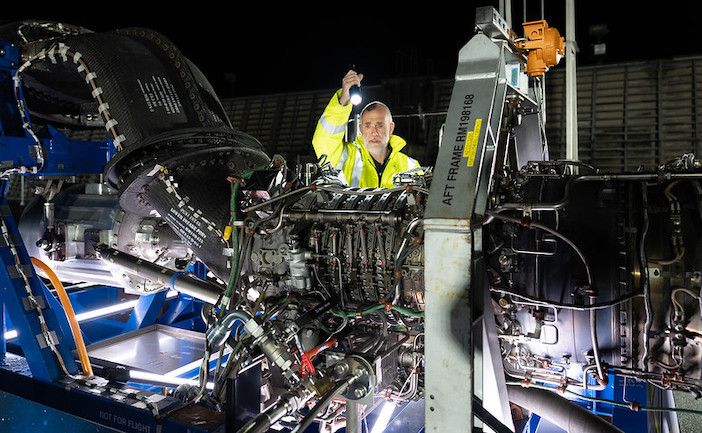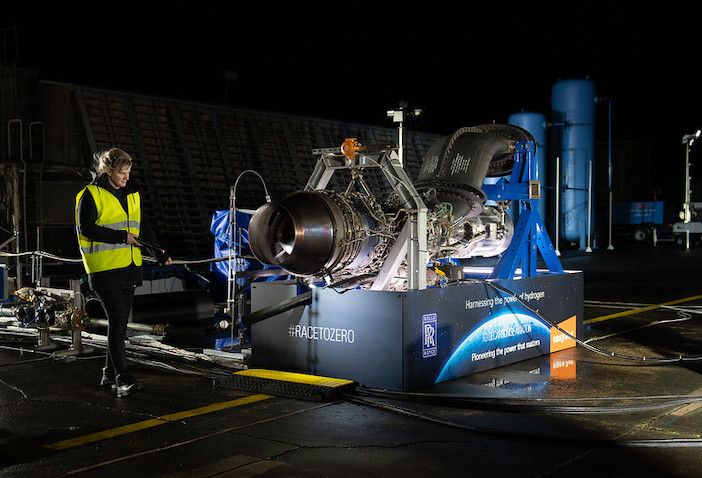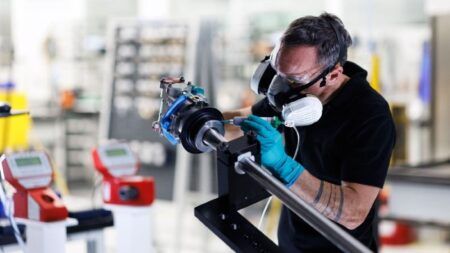Rolls-Royce has successfully run an aero engine on hydrogen gas during ground testing.
Engineers at the UK’s MoD Boscombe Down site used a modified AE2100 turboprop engine used by military transport aircraft such as the Hercules and by the Saab 2000 regional airliner. The engine was run with hydrogen gas that was produced using wind and tidal power.
According to Rolls-Royce, it is the world’s first run of a modern aero engine on hydrogen. The early concept demonstrator marks a major step towards proving that hydrogen could be a zero-carbon aviation fuel of the future, the company added.
Rolls-Royce is partnering with airline Easyjet on the test program. Following analysis of this early concept ground test, the companies plan to run a series of further rig tests leading up to a full-scale ground test using a Rolls-Royce Pearl 15 jet engine, which is used by business jets.
The program’s long-term aim is to carry out flight tests with a hydrogen-fueled engine.
The test took place at an outdoor test facility at MoD Boscombe Down, UK. The green hydrogen for the tests was supplied by EMEC (European Marine Energy Centre), generated using renewable energy at their hydrogen production and tidal test facility on Eday in the Orkney Islands, UK.
Grazia Vittadini, chief technology officer at Rolls-Royce said, “The success of this hydrogen test is an exciting milestone. We only announced our partnership with easyJet in July and we are already off to an incredible start with this landmark achievement. We are pushing the boundaries to discover the zero carbon possibilities of hydrogen, which could help reshape the future of flight.”
Johan Lundgren, CEO of easyJet said, “This is a real success for our partnership. We are committed to continuing to support this ground-breaking research because hydrogen offers great possibilities for a range of aircraft, including easyJet-sized aircraft. That will be a huge step forward in meeting the challenge of net zero by 2050.”

Aerospace companies are pursuing two main ways of fueling aircraft with hydrogen. The more straightforward although still technically complex way is hydrogen combustion, which substitutes current jet fuels for the gas. The higher operating temperatures required and the physical properties of hydrogen are the main technical barriers engineers need to solve.
The second way is to use hydrogen fuel cells to produce electricity, which is then used to power motors. In this arrangement, a fuel cell acts like a battery and an aircraft requires additional development around electrification and fuel cell technology.
Both routes require solving challenging technical problems around the storage and handling of hydrogen. European aircraft maker Airbus has committed to developing a hydrogen aircraft by 2035 and is converting an A380 to flight test hydrogen engines before the end of this decade.
Meanwhile, startups such as ZeroAvia, H2FLY and Universal Hydrogen are planning to build smaller fuel-cell based powertrains for regional aircraft.





